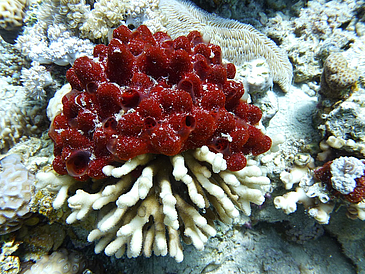By using their metabolism, corals and sponges are able to communicate. This surprising discovery on coral reefs was recently made by an international research team. Interestingly, this food web linkage apparently not only exists in tropical, shallow warm-water reefs, but also in deep-sea cold-water corals reefs. These interesting findings have now been published in the prestigious multidisciplinary journal Scientific Reports by lead author Dr. Laura Rix, who recently obtained her PhD from University of Bremen. The research team is jointly led by Prof.Dr. Christian Wild (Marine Ecology, University of Bremen), Dr. Malik Naumann (Leibniz Center for Tropical Marine Ecology, ZMT), Dr. Jasper de Goeij (University of Amsterdam), und Dr. Dick van Oevelen (Royal Netherlands Institute for Sea Research, NIOZ).
Sponge loop
The researchers found that coral mucus, which is continuously released by corals in large quantities, is rapidly taken up by neighboring sponges. This is remarkable, because the majority of this coral mucus immediately dissolves in the water and is microscopically small. Consequently, this energy- and nutrient-rich mucus cannot be consumed by most other organisms living on the reef. Sponges, however, exhibit the unique ability to transfer the energy and nutrients in dissolved coral mucus to other reef organisms. Via a process called “sponge loop”, they transform invisible dissolved organic matter into visible particles. They do this via extremely fast cell turnover rates, which result in the release of cell pellets. These pellets can then be used as food source by many different reef organisms (e.g. worms, snails, crabs, sea stars), enabling the energy and nutrients in coral mucus to transferred back into the coral reef food web.
Parallel experiments in a distance of 3,000 km
The team of scientists made this discovery by carrying out a series of parallel experiments at research stations in Jordan at the Red Sea and in Sweden at the north Atlantic – two extremely different locations more than 3,000 km apart from each other. Corals and sponges were collected in Jordan from 5-10 m water depth by SCUBA divers and in Sweden from water depths of more than 100 m using a remotely operated vehicle. Despite the pronounced differences in the two locations, the experimental results were very similar. The coral mucus was always readily taken up by the sponges, and very rapidly 20-40 percent of this ingested material was transformed into particulate pellets.
The exiting aspect of this discovery is that this newly discovered food web link between corals and sponges functions similarly in both shallow warm-water and deep-sea cold-water coral reefs, acting to preserve precious energy and nutrients for many reef organisms. This is particularly important because food and nutrients are very scarce on warm- and cold-water coral reefs. The newly discovered food web link between two key coral reef organisms thereby supports the functioning of entire reef ecosystems both in warm shallow tropical and cold deep temperate waters helping them to thrive in food and nutrient limited environments.
Publication: Rix et al. Coral mucus fuels the sponge loop in warm- and cold-water coral reef ecosystems. Sci. Rep. 5, 18715; doi: 10.1038/srep18715 (2015)
Further information
Universität Bremen
Fachbereich Biologie/Chemie
Prof.Dr. Christian Wild
Marine Ecology
Tel.: +49 (0)421 218-63367
E-Mail: christian.wildprotect me ?!uni-bremenprotect me ?!.de

